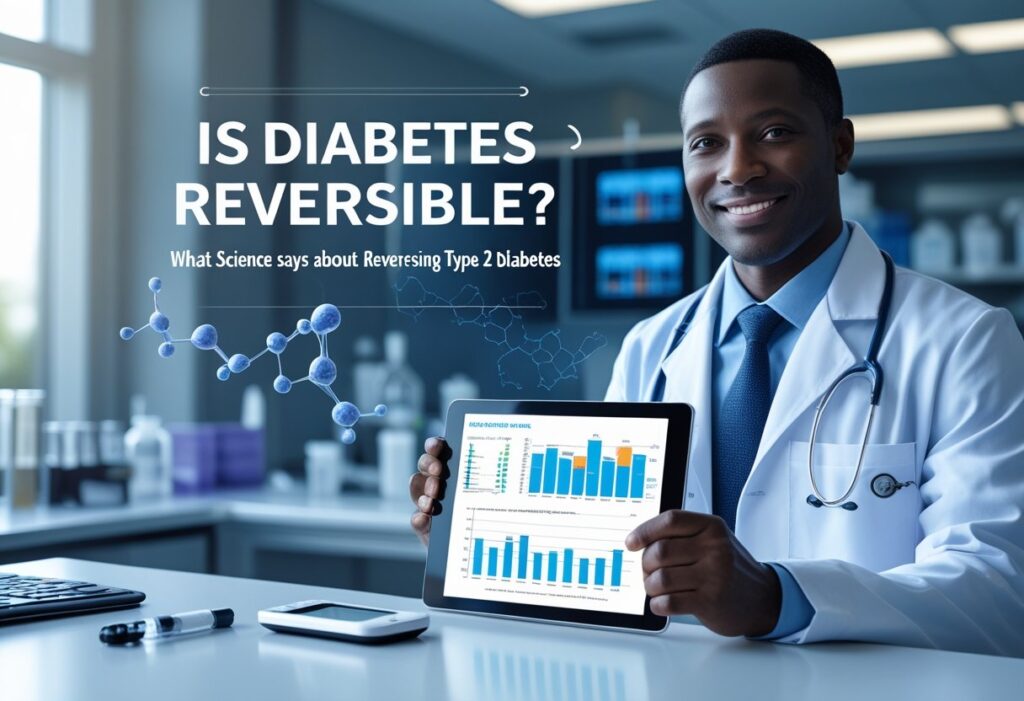Introduction: Can Diabetes Be Reversed?
Diabetes affects millions globally, with Type 2 diabetes being the most common form. Traditionally seen as a lifelong condition, recent research shows that diabetes can be reversible or put into remission, especially when caught early. This blog explores the latest scientific evidence on how to reverse diabetes, effective treatment options, and practical lifestyle tips to help manage and potentially reverse Type 2 diabetes.
What Is Diabetes? Understanding the Basics
Types of Diabetes: Type 1 vs. Type 2
Diabetes mellitus is a chronic disease characterized by high blood sugar levels due to insulin issues. There are two main types:
- Type 1 Diabetes: An autoimmune condition requiring lifelong insulin.
- Type 2 Diabetes: Caused by insulin resistance and often linked to obesity and lifestyle factors.
This guide focuses on Type 2 diabetes reversal due to its potential for remission through lifestyle changes.
How Does Type 2 Diabetes Develop?
Type 2 diabetes develops when the body’s cells become resistant to insulin, and the pancreas can no longer produce enough insulin to compensate. Excess fat, especially around the liver and pancreas, plays a crucial role in this process.
To explore effective lifestyle changes that can help in managing and potentially reversing type 2 diabetes, read our in-depth article on How to Manage Diabetes Without Medication Naturally.
What Does It Mean to Reverse Diabetes?
Diabetes Remission vs. Cure
- Remission: Blood sugar levels return to normal without medication for a sustained period.
- Cure: Complete and permanent eradication of the disease (currently not possible for diabetes).
Understanding this distinction is important when discussing diabetes management and reversal.
Scientific Evidence: Is Type 2 Diabetes Reversible?
The DiRECT Trial: Groundbreaking Research on Diabetes Remission
The Diabetes Remission Clinical Trial (DiRECT) showed that a structured low-calorie diet led to remission in nearly half the participants with Type 2 diabetes after one year. Significant weight loss (over 15 kg) was key to success.
Bariatric Surgery and Diabetes Remission
Bariatric surgery is a highly effective method for reversing Type 2 diabetes, with remission rates up to 80%. Surgery improves insulin sensitivity and pancreatic function through hormonal changes.
Low-Calorie and Low-Carbohydrate Diets for Diabetes Reversal
Studies support low-calorie diets and low-carb diets as effective tools to reduce blood sugar and promote remission by lowering fat in the liver and pancreas.
How Weight Loss Helps Reverse Type 2 Diabetes
Losing 10-15% of body weight can significantly reduce fat in the pancreas and liver, restoring normal insulin production and sensitivity. Early intervention increases the likelihood of remission.
Lifestyle Changes to Reverse Diabetes Naturally
1. Follow a Diabetes-Friendly Diet
- Adopt very low-calorie diets under medical supervision.
- Consider low-carbohydrate or whole-food plant-based diets.
- Avoid processed foods and added sugars.
2. Increase Physical Activity
Regular exercise improves insulin sensitivity. Aim for at least 150 minutes of moderate aerobic activity plus resistance training weekly.
3. Maintain Healthy Weight
Sustained weight loss is crucial for remission. Behavioral support helps maintain long-term success.
4. Seek Behavioral and Psychological Support
Diabetes management requires motivation and adherence. Support groups and counseling can improve outcomes.
Limitations: When Is Diabetes Not Reversible?
- Type 1 diabetes currently has no reversal options.
- Long-standing Type 2 diabetes may cause irreversible pancreatic damage.
- Genetics and disease duration affect remission chances.
- Ongoing medical supervision remains essential.
Emerging Research and Future Directions
New medications, immunotherapies, and personalized medicine approaches offer hope for improved diabetes management and remission in the future. Technology like continuous glucose monitoring and telemedicine support ongoing care.
According to the American Diabetes Association, while type 2 diabetes can be managed effectively, reversal depends on various factors including lifestyle changes and early intervention (American Diabetes Association – Type 2 Diabetes).
Frequently Asked Questions (FAQ) About Diabetes Reversal
Can Type 1 Diabetes Be Reversed?
No, Type 1 diabetes currently cannot be reversed. It requires lifelong insulin therapy.
How Quickly Can Type 2 Diabetes Be Reversed?
Remission can occur within months with significant lifestyle changes or bariatric surgery.
Is Weight Loss Necessary to Reverse Diabetes?
Yes, weight loss, particularly reducing visceral fat, is crucial for remission.
Can Diabetes Return After Remission?
Yes, diabetes can relapse if lifestyle changes are not maintained.
What Diet Is Best for Reversing Diabetes?
Low-calorie and low-carb diets have strong evidence. Sustainability is key.
Can I Stop Medications If I Reverse Diabetes?
Only under medical supervision. Never stop medications without consulting your doctor.
How Important Is Exercise in Diabetes Reversal?
Exercise is vital for improving insulin sensitivity and maintaining weight loss.
Does Bariatric Surgery Cure Diabetes?
It can induce remission but is not a cure. Surgery requires lifelong follow-up.
Why Is Early Diagnosis Important?
Early intervention improves chances of remission before permanent damage occurs.
Should I Attempt Diabetes Reversal Alone?
No, always work with healthcare professionals for safe and effective management.
Conclusion: Take Control of Your Diabetes Today
Scientific evidence confirms that Type 2 diabetes can be reversed or put into remission through early diagnosis, significant weight loss, diet changes, and increased physical activity. While remission requires ongoing commitment and medical care, it offers hope for improved health and quality of life.
If you have Type 2 diabetes, consult your healthcare provider about personalized strategies to manage or reverse your condition.
References:
- Lean MEJ, Leslie WS, Barnes AC, et al. Lancet. 2018;391(10120):541-551.
- Schauer PR, Bhatt DL, Kirwan JP, et al. N Engl J Med. 2017;376(7):641-651.
- Taylor R. Diabetes Care. 2013;36(4):1047-1055.



Pingback: Why Is Fasting Sugar Normal But Post-Meal Sugar High? Causes Explained - Pharma Heals